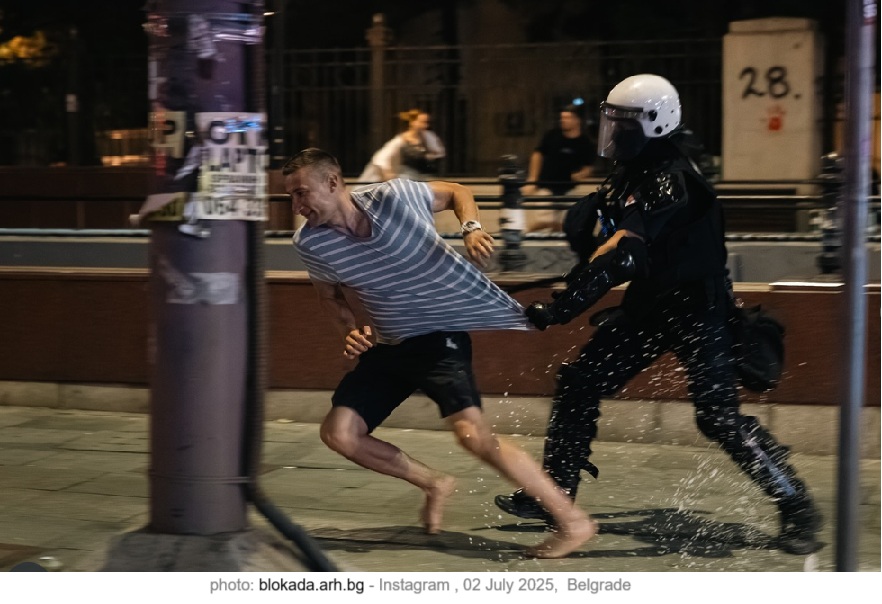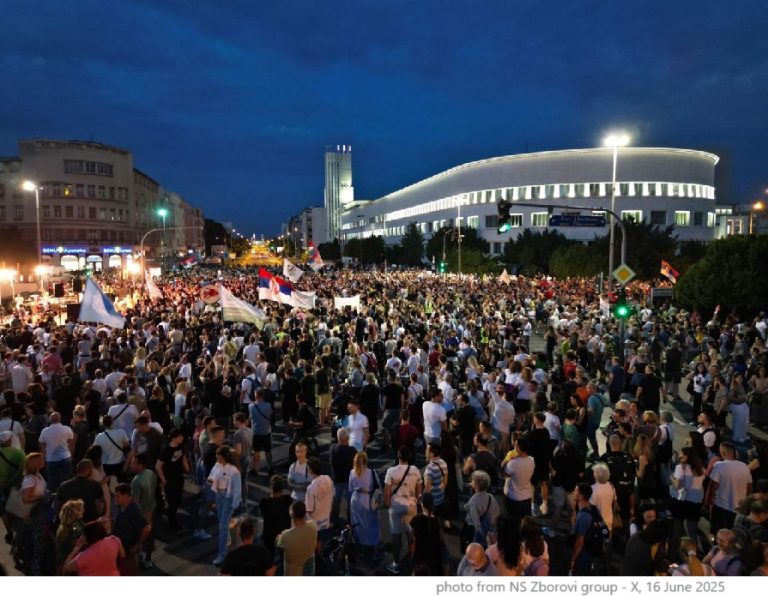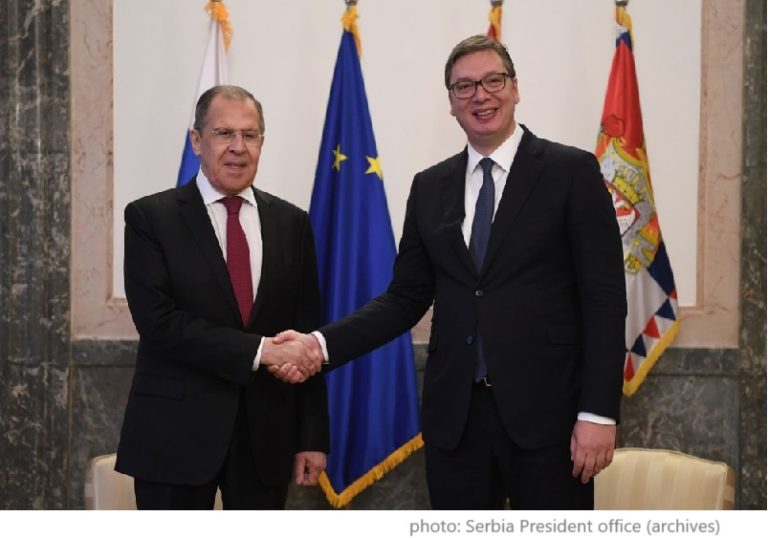“I am deeply convinced that the window for a peaceful resolution of Serbia’s crisis is closing, and that timely preventive measures can avoid violence and armed conflict”
By Dušan Janjić,
Belgrade, 14 August 2025, dtt-net.com / peacefare.net – The Non-Paper “Report on the State and Threats to Human Security, Human Rights, and Freedoms in the Republic of Serbia is intended for domestic and international social, business, political, and other stakeholders whose actions influence the course of the ongoing crisis in Serbia.
The Non-Paper
The document is based on available information regarding the severity of the crisis, the state of security in the country, and political will, preparedness, and capacity of various actors to help preserve peace and stabilize the situation.
A. Serbia Facing Structural Destabilization
Political and social crises, coupled with growing security instability, have come to dominate everyday life in Serbia. The government’s response has included measures reminiscent of a state of emergency and a creeping coup, raising the risk of further escalation.
President Aleksandar Vučić remains one of the most influential actors in this crisis. He has consolidated control over the media, key budgetary and investment decisions, and the management of the Serbian government, particularly its diplomacy, the military, and the police. The president is using this authority to advance the values and interests of a single segment of society and to build the Movement for the Defense of the State. His conduct violates both the letter and the spirit of the Constitution and the Law on the President, which define the president’s primary duty as safeguarding the unity of the state.
Public protests and widespread sentiment challenge the legitimacy of such conduct, raising calls for current president’s resignation or impeachment, and for extraordinary presidential elections. There is an emphasized need to undertake appropriate activities to strengthen political will and reach a political agreement on the conditions for electoral verification of the government.
B. Activities and Mechanism for a Peaceful Exit from the Crisis
B.1 Measures for De-escalating Threats to Human Security
- Independent Expert Commission: Establish a body to monitor and report on social conditions and security trends, and propose measures for de-escalating threats to human security, human rights, and freedoms. The Commission should cooperate with domestic and international experts, institutions, and organizations, supporting the work of an Ad Hoc Mechanism for Facilitating a Peaceful Exit from the Crisis.
- Countering advocacy of intolerance, violence, and extremism: All competent institutions must take lawful measures to suppress advocacy of intolerance, hatred, and extremism; to stop the increase in police violence; and to prevent the abuse of prosecutorial and judicial functions, including misdemeanour courts.
- Role of the President and National Security Council: Adopt measures to stop the increase of police violence and torture. Take measures to dismantle para-police groups and stop their activities and violence —especially those supported by the ruling parties, funded through misuse of public resources or illicit means, supported by the police, and tolerated by parts of the judiciary.
- Role of the Supreme Public Prosecutor’s Office: Fulfil legal obligations to combat extremist and para-police activities, especially those connected to political parties, public officials, and organized crime.
- Parliamentary and institutional oversight: Activate existing mechanisms for parliamentary and other forms of public oversight over the security and intelligence community in Serbia, especially the police and the Security Intelligence Agency (BIA).
- Assessment of institutions of special public importance: Urgently review whether the key institutions— Constitutional Court, Anti-Corruption Agency, Commissioner for Information of Public Importance and Personal Data Protection, and Protector of Citizens—are fulfilling their constitutional and legal mandates and effectively contributing to the protection of human security, rights, and freedoms in Serbia.
- National Security Agency: Consider establishing an agency legally designated as one of key actors in upholding the rule of law, responsible for providing critical security and defence information to authorized institutions, countering cyber and communications threats, protecting individuals and facilities, safeguarding the national currency and payment systems, and leading or assisting in investigations into war crimes, terrorism, and politically motivated murders.
- Police reorganization: Create legal and operational conditions to reorganize the police into a single structure with a unified chain of command and management.
B.2 Roundtable on Stabilizing the Situation in Serbia
The Roundtable on Stabilizing the Situation in Serbia is an ad hoc mechanism that enables reaching a political agreement to overcome the current legitimacy crisis and irregularities in the work of the National Assembly of Serbia, Assembly of AP Vojvodina, city and municipality assemblies, as well as local community councils throughout Serbia.
Rationale:
- Deep political and social divisions;
- High public distrust in authorities;
- Conflict between the opposition and the government;
- Limited crisis capacity management on both sides;
- Lack of acceptable institutional framework for dialogue;
- Risk of radicalization, parallel institutions, and violent resistance;
- Infiltration of para-state structures and organized crime into state institutions, especially in the security and intelligence sector.
Goals:
- Reach political agreement on conditions for fair and democratic elections;
- Ensure peaceful, democratic resolution of the political and security crisis;
- Establish basic rules and mechanisms to reduce tensions and security risks.
Participants:
- Representatives of protesting citizens, civic initiatives, student, professional, local, and other movements with significant public support;
- Parliamentary political parties.
Moderation:
- Moderator of the Roundtable may be an individual or a collective body, either a Serbian citizen and/or a representative of the international community (the Quint is recommended).
- Moderator selection requires unanimous approval of all participants.
Expected outcome:
- Consensus on creating conditions for free and fair elections, including:
- Integrity of voter register and prevention of biometric and data abuse;
- Independent monitoring of the activities of the Republic Data Center;
- Decision on the electoral system model (majority or proportional);
- Introducing larger number of electoral districts;
- Direct voting procedures and ballot security;
- Balanced regional and minority representation;
- Financing of political parties and campaigns.
Recommendations:
- The National Assembly elected in early elections should serve as a constituent assembly;
- It is necessary to set a specific timeframe for the transitional period. For the president and the constituent assembly, this period should be shorter than the term established by law for those elected in regular elections;
- Reaching an agreement on the schedule for holding extraordinary elections at all levels.
C. Role of the President in Serbia’s Stabilization
Given the serious security challenges facing Serbia and the need to prevent further destabilization, particular focus is on the role of the president, National Security Council, and the security and intelligence community in Serbia.
Public debate frequently raises the question: Who will replace Vučić? This Non-Paper does not answer this question but stresses the need for electoral change of this function and outlines tasks for the president to ensure a peaceful, democratic transfer of power and stabilization in the country.
It is the Responsibility of the President of the Republic of Serbia to:
- Initiate measures to guarantee the property rights of citizens, public and state property, as well as the property of companies and cooperatives, legacies, and more; promote an effective restitution process to return unjustly taken property to its rightful owners.
- Support the creation of an environment fostering business, political, and social cooperation, respect for the rule of law, institutional recovery, and solidarity.
- Encourage dialogue on Serbia’s Reform and Sustainable Development Strategy for the coming decade, involving the businesses community, experts, civil society, and international partners.
- Support opening Serbia to multinational corporations that contribute to sustainable development, while respecting the interests and needs of domestic economy and the public, especially in strategic sectors, such as, food production, water management, mining and processing of rare metals, energy, and human security.
- The Law on the President and other related laws should clearly define the President’s rights, duties, and responsibilities to uphold the Constitution, laws, and strategic documents essential for Serbia’s sustainable development, stability, security, and defense. The President must adhere to these responsibilities when deciding on granting a mandate to form the government, approving laws, and appointing Constitutional Court judges and diplomatic representatives.
- When signing decrees promulgating laws, the President is obliged to provide explanations for the decision to give consent and point out appropriate and necessary amendments to the law and Constitution.
- Contribute to strengthening judicial independence; eliminate the practice of protecting acquired privileges and monopolies; prevent the National Assembly from acting as a “party personnel filter” in the judiciary.
- Provide support to judicial and investigative authorities in combating corruption, organized crime, and terrorism, directly and/or through the National Security Council.
- Initiate comprehensive monitoring, review, and reporting on cooperation with foreign intelligence services; initiate ending the practice of involving BIA and VOA members in prosecutorial teams and overseeing prosecution work; initiate removing VOA’s influence over the War Crimes Prosecutor’s Office.
- In carrying out duties of appointments and awards, the President is obliged to respect and is accountable for the integrity of the individuals being appointed or honored.
- Respects diversity and promotes the integrative policies. Given the importance of interethnic relations for Serbia’s development, stability, and security, and considering the prolonged inactivity of the National Council for National Minorities, the President of the Republic should be legally authorized to chair this Council.
D. Urgent Measures
The Law on the President of the Republic should clearly define, in line with the Constitution and other laws, the criteria for granting amnesty and pardon, along with the President’s accountability for failing to adhere to these criteria.
It is necessary to examine the President’s past actions in relation to sustainable development issues, with an immediate focus on halting the President’s involvement in bodies and institutions that approve major capital investment projects.
It is necessary to ensure adequate infrastructure and human resources to enable effective performance of the President’s public duties. To this end, a review of the legal status and responsibilities of the National Security Council is required, recognizing it as a key body for improving security conditions and guiding the activities of the security and intelligence community.
Members of the National Security Council can only be worthy citizens of Serbia, with proven qualifications and experience in the fields of strategic planning and directing security development in all its aspects.
The Council should be chaired by the President of the Republic and/or the Security Adviser to the Republic of Serbia.
The current Bureau for Coordination of Security Services should be replaced by a Bureau for Coordination of Activities of the Intelligence and Security Community. Its members should be representatives from the National Assembly, the Government of Serbia, and the Ministries of Foreign Affairs, European Integration, Internal Affairs, and Defense. The existing Bureau for Coordination of Security Services should be transformed into a Coordinating Body of the Intelligence and Security Community, composed of the heads of security and intelligence agencies.
——————————————————————————————————————
The author is founder and President of the Belgrade-based Executive Board of Forum for Ethnic Relations. He specializes in Sociology of Nationalism; Ethnicity; Ethnic Conflicts and their Resolution; Human and Minorities Rights; Political Movements and Ideologies; Peace Making and Peace Building.
This opinion was first published at peacefare.net website.
The views and opinions expressed in this article are those of the author and do not necessarily reflect the official policy or position of dtt-net.com.



